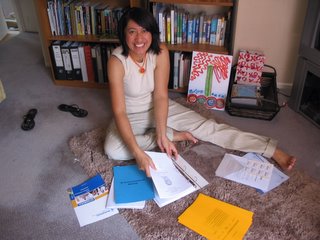North Country thoughts
Last week I blogged about a whole bunch of movies, including North Country.
Such a good movie! (Warning, spoilers below... stop right here if you don't want to know how the story turns out!)
I was first of all interested in how it was marketed. Here in New Zealand, it was presented as a feel-good film that would make you glad to be alive (or something like that).
Strange, because the first half of the film displays a really hard life - hard mining work, poverty, and the constant threat of sexual assault.
But the marketing was right, the final scenes of this film make you feel like you yourself have won a great victory. While a tragedy shows everything that should be right going wrong, this shows everything going wrong, then coming right. It's brilliantly done.
What about Leadership?
Most obvious candidate for best character is Charlize Theron's character, Josie Ames. While her female co-workers are willing to settle for horrible treatment because of fear, she can't abide the status quo.
Both she and her co-workers see the same thing: gross injustice in the present, the difficulty of changing it, and the possibility of it getting worse if any complaint backfires. But while they see that as a reason not to do anything, she sees it as an unacceptable situation that must be changed.
She's willing to go through the risk, endure attacks on every area of her life, and even have a deep dark secret dredged up - all to change life for the better. And her example inspires others.
So, without a doubt, Josie is the hero of this story.
But I also noticed her father, Hank. He begins the movie as everything that's wrong with men in this story. He's not one of the ones who abuse and harrass, but he is one of the ones who stand by let it happen. He has no honour, only a sense of shame in his daughter. Selfish, and downright unmanly!
His character is painted so thoroughly apathetic that I wondered if he would ever change. So when he got up and stood by his daughter in the union meeting, I nearly cried. Finally, you're becoming a man! Better late than never.
However, that's easy to say from the cinema seat. What would be the scenario if it was me there, in a culture absolutely entrenched in the status quo, where your entire social network depends on getting on with these SOBs, harrassers, abusers? I'd like to think I'd stand up sooner than Hank did, to realise my job as a father was to protect my daughter, not my own reputation.
Last post I talked about the character's journey. Hank had one hell of a journey.



